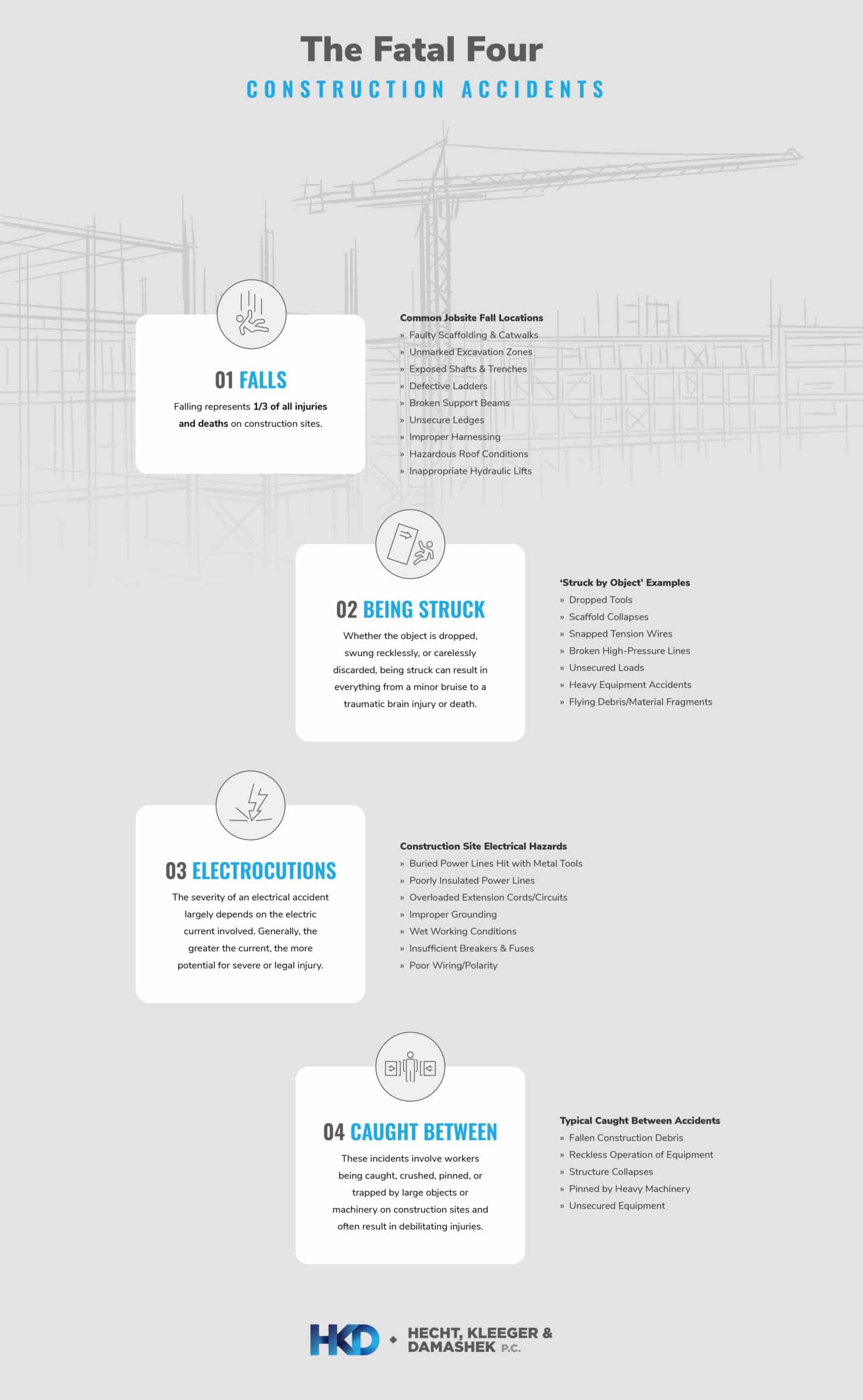Despite only making up 6% of the labor force, an estimated 20% of U.S. worker deaths are construction-related. In addition, 2021 saw 169,000 non-fatal construction accident injuries.
These figures show a genuine need to improve safety on construction sites. Here’s a look at where many construction accidents happen, so you can hopefully avoid serious harm. In the event that you do encounter serious harm, it is a good idea to have a construction accident attorney you can call for help.
The ‘Fatal Four’ Construction Accidents
The construction accidents most likely to cause a severe or fatal injury are referred to as the “the fatal four.” These incidents include falls, being caught in or between objects, electrocutions, and being struck by things on job sites. They account for 60% of construction accidents.
Such accidents usually stem from negligence, unsafe conditions, improper equipment use, and lack of safety protocols.
1. Falls
Construction workers are frequently on ladders, scaffolding, and other unstable surfaces. And despite the construction company’s duty to provide harnesses, secure scaffolding, and other safety equipment, falling is an understandable concern since these accidents represent more than 1/3 of all injuries and deaths on construction sites.
Common Jobsite Fall Locations
- Faulty Scaffolding & Catwalks
- Unmarked Excavation Zones
- Exposed Shafts & Trenches
- Defective Ladders
- Broken Support Beams
- Unsecure Ledges
- Improper Harnessing
- Hazardous Roof Conditions
- Inappropriate Hydraulic Lifts
2. Struck by Objects
This refers to workers being hit by any of the dangerous objects or heavy machinery standard on a job site. Whether the object is dropped, swung recklessly, or carelessly discarded, being struck can result in everything from a minor bruise to a traumatic brain injury or death.
‘Struck by Object’ Examples
- Dropped Tools
- Scaffold Collapses
- Snapped Tension Wires
- Broken High-Pressure Lines
- Unsecured Loads
- Heavy Equipment Accidents
- Flying Debris/Material Fragments
3. Electrocutions
Live wires and electricity are typical hazards on most construction sites. The severity of an electrical accident largely depends on the electric current involved. Generally, the greater the current, the more potential for severe or legal injury
Construction Site Electrical Hazards
- Buried Power Lines Hit with Metal Tools
- Poorly Insulated Power Lines
- Overloaded Extension Cords/Circuits
- Improper Grounding
- Wet Working Conditions
- Insufficient Breakers & Fuses
- Poor Wiring/Polarity
4. ‘Caught Between’ Accidents
These incidents involve workers being caught, crushed, pinned, or trapped by large objects or machinery on construction sites. These accidents often result in debilitating injuries, such as amputations, organ damage, internal bleeding, brain or spinal trauma, and even death.
Typical Caught Between Accidents
- Fallen Construction Debris
- Reckless Operation of Equipment
- Structure Collapses
- Pinned by Heavy Machinery
- Unsecured Equipment

Hazards on Construction Sites
Workers on a construction site use various complex, potentially dangerous equipment under all sorts of conditions. While the construction sector has rules to minimize the risk of injury, when safety measures are ignored, the workers pay the price.
Slips, Trips, & Falls
Worksites can be busy and hard to navigate, even if you’re careful. A wet surface, a hastily placed cord, or construction debris are just a few things a worker should be aware of.
Toxic Exposure
Construction workers regularly encounter hazardous materials like lead, asbestosis, silica, mold, and chromium. These toxic substances can lead to respiratory and other health issues, so workers must be aware of their presence and adequately protected.
Vehicle Accidents
Construction vehicles like bulldozers, backhoes, and cranes are large, heavy, and require considerable training to operate safely. Negligence can result in collisions, workers being struck, and other unfortunate incidents.
Worker Overexertion
Workers in the construction industry are often subjected to less-than-ideal conditions. From high to freezing temperatures and long hours of labor, workers are prone to overexert themselves.
Repetitive Stress
Working in construction usually requires a lot of repetitive motion tasks using the muscles in the back and neck. Prolonged use can result in painful injuries and a lack of mobility without proper training and equipment.
Crane & Heavy Equipment
About 75% of struck-by fatalities involve heavy equipment, like trucks or cranes. And while large pieces of machinery are often an essential part of a construction project, they need to be correctly maintained and operated to reduce the risks.
Key Take Aways – Construction Site Safety
According to the National Safety Council, 67% of construction workers felt their safety came at the expense of the employer’s productivity goals. And while there will always be some risk attached to the construction industry, workers should be aware of their legal rights, adhere to safety regulations, and call out negligence.
There are a lot of ways to make construction sites safer for workers, and we owe it to them to try.
If you are a construction worker injured because of unsafe conditions on a job site, Hecht, Kleeger & Damashek, P.C. has extensive experience helping construction accident victims get justice and compensation for their losses. Let us discuss what happened and what’s next.
Free Consults & No Fees Unless We Win.
